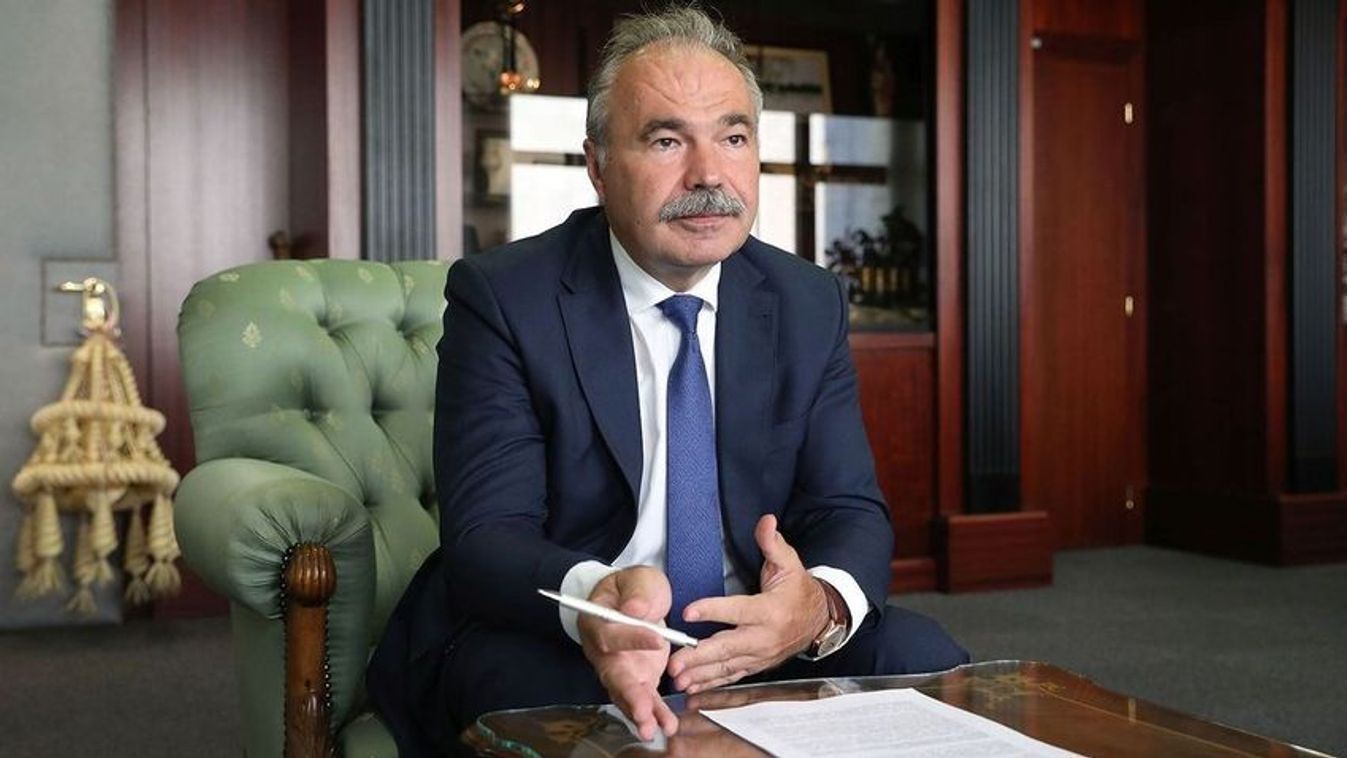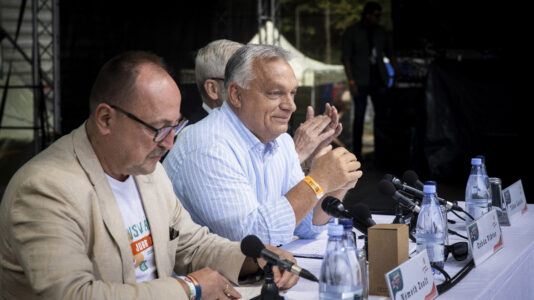This interview has been shortened in some areas.
The first meeting of the ministers of agriculture in the new parliamentary term took place under your leadership. What experiences did you have when you returned home from Brussels?
Symbolically and literally, we rang the bell in Brussels, and the Hungarian presidency of the Agriculture and Fisheries Council could also begin. It was an uplifting moment. I was particularly pleased that the ministers or state secretaries of all 27 countries participated in the July 15 meeting. Thanks to this, we were able to have an important discussion. Both this and the informal conversations revealed that the ministers of the member states recognize the Hungarian presidency program.
What important tasks for farmers has Hungary set for its six-month presidency?
The Hungarian program focuses on five priority areas: the crisis of European agriculture, competitiveness, a farmer-centered approach that respects traditions, sustainability, and knowledge-based agriculture. It is a huge achievement that all member states agreed with these priorities without exception. We started the session with strong topics, including the protection of the rural lifestyle, the challenge of generational change, and demographic issues. These topics have not yet been on the agenda in this form in EU agricultural policy.
From the first day of our EU presidency, our country has been subject to serious criticism and threats, and Brussels has been disturbed by our consecutive presidency. Was this not felt at all at this agriculture minister summit?
The atmosphere was not hostile at all; in fact, there was a sparkling, lively dialogue. I see that our country can fulfill the duties of the European Union’s presidency in a special period which has great potential.
Why is this period special?
According to the decision-making procedure of the Union, the European Commission presents a proposal, the ministers of agriculture discuss it, if appropriate, accept it, and the common agricultural policy proceeds accordingly. The committee has not yet been reconstituted, so the ministers can have more influence with their proposals. We, the ministers of agriculture, can make a recommendation to the newly established committee, thereby exerting considerable influence on Brussels.
In September, there will be an informal meeting of the ministers of agriculture in Hungary, where we would like to hold a dialogue on the mentioned strategic topics. Regarding the results of the deliberations, we will formulate so-called conclusions for the Brussels board that will be set up in the fall. There is apparently the intention and will for cooperation on the part of the member states, so I expect significant results in the coming months.
Did Europe understand the message of farmers protesting across the EU at the beginning of the year against the excessive green ideology represented by the European Green Deal?
Yes, now the new priorities I just mentioned have become the focus. The European direction in the fields of agri-food has completely changed. The green ideology forced on us must be suppressed. Partly for this reason, we are fighting for the restructuring of the institutional structure in Brussels. There would be a need for a committee attitude that treats agriculture not as an enemy, as well as for the new agricultural commissioner not to be subordinated to a vice-president representing such views in the Brussels hierarchy, as was the case in the previous term.
Such a realignment would remove this rather harmful green ideological pressure and producers could finally be freed from the political shackles.
At the same time, the conditions for competitive production must be created, farmers must be provided with a suitable vision of the future, and it must be guaranteed that quality food will continue to be on the tables of the European people.
Will sustainability be relegated to the background?
Far from it! We also work to improve the state of the created world around us. The effects of climate change are extremely serious, and everyone can experience this firsthand during summer heat waves. At the same time, sustainability is a complex concept, in addition to climate protection, it also means, for example, adaptation to the market environment. The global market situation leads to extraordinary challenges, and we also have to respond to the continuous changes in social needs.
There is only a chance for this if we do not follow toxic green ideologies that destroy competitiveness and make the future of agriculture hopeless, thereby putting Europe’s food security at risk. Farmers have rightly felt betrayed in recent years. They had to comply with all the strict regulations and rules of the Green Deal, while their markets were not protected by anyone, since the products of third countries, which are not subject to EU regulations, were released onto them.
One of the biggest concerns is Ukraine, one of the most difficult stages of the accession negotiations may be the adaptation of the vast Ukrainian agriculture to European standards. How can we deal with this challenge?
Ukraine’s accession to the EU is a huge challenge because the common agricultural policy would have to be fundamentally transformed. If there would be an advantage to Ukraine’s accession, then at most it would be that the same rules that apply to us will apply to producers in Ukraine.
Is it conceivable that Ukraine’s capabilities and the giant companies farming in its territory will bleed European farmers to death?
If we compare Ukrainian grain with Hungarian grain, we will always lose on a quantitative basis, since compared to European member states, Ukrainian agriculture produces many times more. Therefore, we must compete and win in added value, that is, take Ukrainian agricultural raw materials and create Hungarian or European end products of superior quality. This is how we can maintain our market advantage, which is necessary for our survival, there is no other way.
EU solidarity with Ukraine put European producers at a disadvantage. Will the EU’s position change or will it insist on unlimited food imports?
Ukrainian agricultural products are starting to find their way back to their old markets, so Europe is no longer under such pressure. Fortunately, the majority of trade is no longer carried out on land corridors, so we are not affected by the impact of Ukrainian agricultural products as much as before. We’re finally starting to catch our breath.
The other important circumstance is that, although the European Union reacts slowly and with difficulty, too bureaucratically, it has introduced quantitative quotas for several products, and as a result, customs duties may also be imposed.
In Brussels, they realized that it is not possible to allow Ukrainian agricultural products onto the European market without regulation or control. All of this is a huge improvement compared to a year or two ago.
Regarding Hungary, we will continue to keep our borders closed to Ukrainian products until the market is fully restored. The work will continue as the autonomous trade liberalization measure expires in June 2025. New measures will then be needed, which is why I consider the future of European trade policy one of the priorities and one of the most important topics of conversation.
Licensing new foods is an EU competence, and Brussels objected to Italy’s similar ban. Can Hungary still ban these with a member state decision?
We learned from the example of Italy, which is why we conducted the social consultation in Hungary on the bill regulating laboratory meat. We have sent the text to Brussels, and if we get it back in the autumn, it could become legislation. According to our intentions, this regulatory proposal serves to ban both the distribution and the production of meat produced under laboratory conditions in Hungary. We also fought so that in the case of a licensing procedure, we could stay out of this even if a product receives an EU license.
The vast majority of member states consider (lab-grown meat) dangerous, absolutely harmful, and do not want it to appear in their country as a new food. At the same time, the importance of innovation was discussed. We agreed that it is essential and beyond all dispute that the customer be able to make a decision and choose, as well as be aware of the food ingredients. So labeling and marking play a huge role, especially in the case of new foods.
Can Hungarian farmers also benefit from the results achieved during the EU presidency?
Naturally. It is important that the most important goals set in our program have a significant impact on domestic producers as well. We have a huge advantage in terms of food that is produced in Europe, affordable and safely available, and traceable from farm to table. We must maintain this strategic role in the future.
This is precisely why our country is devoting historic amounts of resources to the renewal of agriculture and the food industry.






